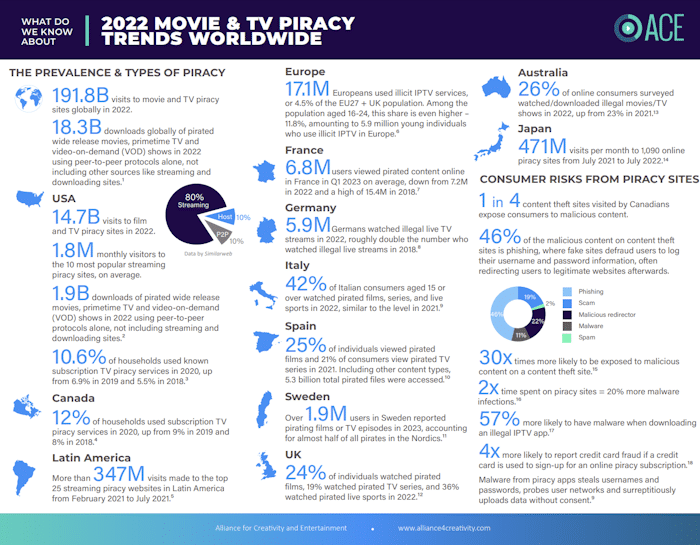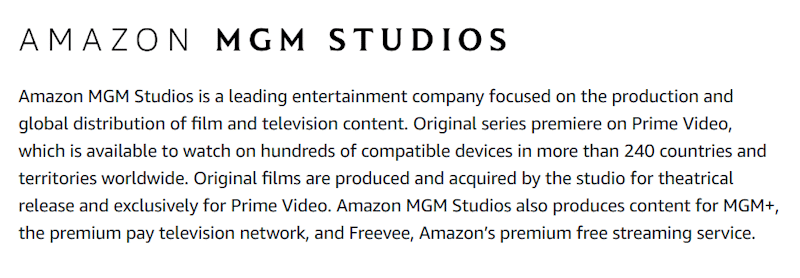A pictorial timeline on the Motion Picture Association’s website begins with a 102-year-old photograph taken at the first meeting of the Motion Picture Producers and Distributors of America (MPPDA), the organization known today as the MPA.
“Since that time, the MPA has served as the leading advocate of the film, television, and streaming industry around the world, advancing the business and art of storytelling, protecting the creative and artistic freedoms of storytellers, and bringing entertainment and inspiration to audiences worldwide,” the introduction reads.
In 2024, the MPA can be found doing all of the above in most countries around the world. Yet if intellectual property laws had been more rigorously enforced well over a century ago, the story of Hollywood may have ended before it even began. Thomas Edison’s hoarding of over 1000 patents included many that were vital to movie making. As a result, filmmakers were given a blunt choice; they could do it his way and pay for the privilege, or they could choose no way at all.
With intellectual property law threatening to stifle creativity, some filmmakers took a third, unadvertised option. 1) Go to Los Angeles, where Edison and his patent bullying would be less effective. 2) Start building Hollywood anyway, and then 3) Around seven years after the first studios opened for business, photograph the historic moment for the history books and keep looking forward.
“The Growing Threat of Film Piracy”
Despite an alleged transgression here and there, respect for all intellectual property has been the unshakable start, beginning, and end of the MPA’s policy for decades. In 1975, the MPAA, as it was then known, established the Film Security Office to work with law enforcement in an effort to calm the “growing threat of film piracy.”
It’s a phrase still in common use today, but back then, the numbers were a little less extreme. At that time, it was claimed that movie piracy cost the industry more than $100 million a year, or close to a third of the cost of Apollo 11 (~$355m), the mission that placed a human being on the moon.
Adjusted for inflation alone, that’s around $584 million in today’s money. To put that into perspective, last December the MPA informed lawmakers that piracy of filmed entertainment now costs the U.S. economy $29.2 billion and over 230,000 jobs annually.

Figures like these, coupled with statistics similar to those in the image above, represent tens of thousands of hours of research carried out by a wide range of organizations. The majority are either linked to the MPA directly via memberships or funding, or indirectly linked to the MPA through its members’ memberships of other organizations. Other entities do business with members of the MPA or the affiliated ACE anti-piracy coalition.
That’s not intended to cast doubt on the veracity of any study or report; it’s simply the most obvious example of the MPA’s unprecedented power, reach, and influence in the filmed entertainment sector – not to mention many governments – on a truly global scale.
MPA Dials in Even More Reach, Power, and Influence
When it comes to shaping global policy in a way that benefits the MPA, there’s no such thing as too much power. Being able to call on the combined might of members Paramount Pictures, Sony Pictures, Universal Studios, The Walt Disney Studios, and Warner Bros. Discovery is part of daily business for the MPA.
Since 2019, the MPA members list has also included Netflix which, along with its movie and TV show creating counterparts, also provides leadership as a founding / governing member of the ACE anti-piracy coalition.
Until now, the only founding member / governing board member of ACE that hasn’t counted itself among the members of the MPA, is the entity previously known as Amazon Studios LLC. An announcement by the MPA confirms that after many years trying to get Amazon on board, on October 1, 2024, Prime Video & Amazon MGM Studios will join the MPA as its most recent member.
And Then There Were Seven
“The MPA is the global voice for a growing and evolving industry, and welcoming Prime Video & Amazon MGM Studios to our ranks will broaden our collective policymaking and content protection efforts on behalf of our most innovative and creative companies,” says Charles Rivkin, Chairman and CEO of the MPA.
“MPA studios fuel local economies, drive job creation, enrich cultures, and bolster communities everywhere they work. With Prime Video & Amazon MGM Studios among our roster of extraordinary members, the MPA will have an even larger voice for the world’s greatest storytellers.”

Mike Hopkins, Head of Prime Video & Amazon MGM Studios, says the company is proud to join the world’s most powerful entertainment industry group.
“Amazon’s mission is to entertain customers around the world with compelling film and television. In order to do that, we must support storytellers, while also helping to sustain a robust entertainment industry that works for both studios and our creative partners,” Hopkins says. “We are proud to join the MPA and its member studios in their collective efforts to protect creators, content, and consumers worldwide.”
In common with the other members of the MPA, Prime Video & Amazon MGM Studios will likely pay millions towards the MPA’s annual running costs. However, if all goes to plan on everything from piracy reduction to taxation, membership might not end up costing Amazon very much at all. Now there’s a light bulb moment.
From October 1, 2024, the MPA members list will read as follows: Netflix, Paramount Pictures, Prime Video & Amazon MGM Studios, Sony Pictures, Universal Studios, The Walt Disney Studios, and Warner Bros. Discovery.
From: TF, for the latest news on copyright battles, piracy and more.
Source : Amazon Joins the MPA as its Newest Anti-Piracy Member Since Netflix in 2019







